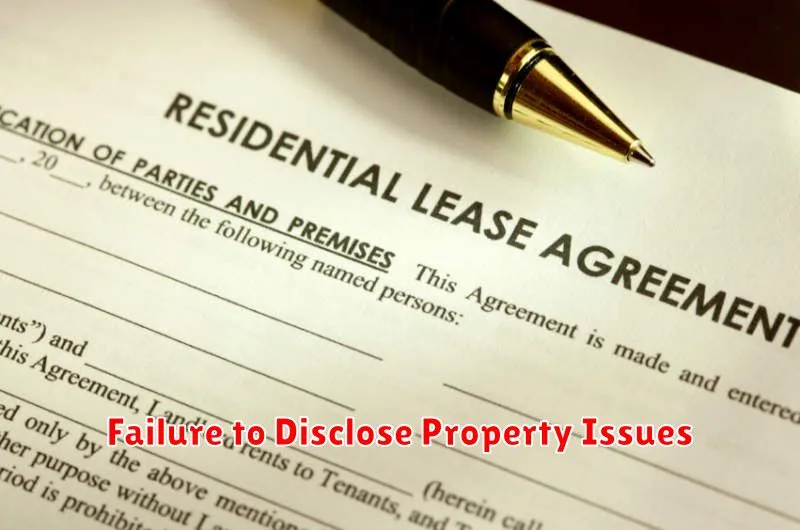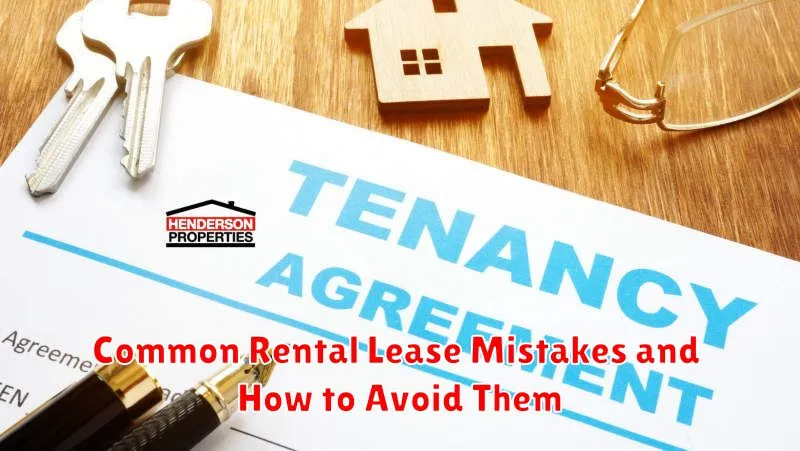Signing a rental lease is a significant commitment, binding both landlord and tenant to a legally enforceable agreement. Navigating the complexities of a lease can be challenging, and common rental lease mistakes can lead to costly disputes, unexpected expenses, and significant stress for both parties. Understanding the nuances of lease agreements and knowing the common pitfalls to avoid is crucial for a successful and harmonious landlord-tenant relationship. This article will explore common rental lease mistakes made by both landlords and tenants, providing valuable insights and practical guidance on how to avoid them, ensuring a smooth and legally sound rental experience.
From overlooking crucial clauses regarding security deposits and rent increases to neglecting proper documentation of property condition, common lease agreement oversights can have far-reaching consequences. Whether you are a seasoned landlord or a first-time renter, understanding the common rental lease mistakes outlined in this article will equip you with the knowledge necessary to protect your rights and interests, fostering a positive and productive rental experience. Learn how to avoid these common errors and ensure a clear, mutually beneficial, and legally sound lease agreement.
Vague Lease Terms
Ambiguity in a lease can lead to disputes and misunderstandings. Clearly defined terms are crucial for both landlords and tenants. Vague language regarding responsibilities for repairs, pet policies, or the definition of “normal wear and tear” can create conflict.
For example, a clause stating the landlord is responsible for “necessary repairs” is open to interpretation. What constitutes “necessary” can vary greatly. A more specific clause would outline specific responsibilities or provide a process for determining necessary repairs.
Review the lease carefully for any ambiguous wording. If anything is unclear, request clarification from the landlord and ensure any agreed-upon changes are documented in writing before signing.
Failure to Disclose Property Issues

Landlords have a legal and ethical obligation to disclose any known material defects or issues affecting the property. This includes problems with plumbing, electrical systems, heating, ventilation, structural integrity, pest infestations, and mold. Failure to disclose such issues can lead to legal disputes, fines, and even lawsuits from tenants.
Transparency is key. Clearly document any existing problems in the lease agreement. This protects both parties involved. For the landlord, it provides evidence of disclosure. For the tenant, it serves as acknowledgment of the issue’s pre-existing nature.
Not Specifying Maintenance Responsibilities
A common oversight in lease agreements is the lack of clarity regarding maintenance responsibilities. Failing to clearly define who is responsible for what can lead to disputes and costly repairs down the line. Ambiguity breeds conflict, so it’s crucial to address this upfront.
Landlords are typically responsible for major structural repairs, such as roof leaks or plumbing issues. Tenants are often responsible for minor maintenance tasks, like changing light bulbs or unclogging drains. However, these responsibilities should be explicitly stated in the lease.
Consider including a detailed list outlining specific maintenance tasks and who is responsible for each. This proactive approach can save both parties time, money, and frustration in the long run.
Ignoring Local Rental Laws
Landlords and tenants must adhere to all applicable local ordinances. These laws can vary significantly between jurisdictions and cover various aspects of the landlord-tenant relationship.
Common areas regulated by local laws include security deposit limits, required disclosures, notice periods for termination or rent increases, and permitted reasons for eviction. Ignoring these regulations can lead to legal challenges, fines, and invalidated lease agreements.
Thoroughly research local rental laws before drafting or signing a lease. Consulting with a real estate attorney or local housing authority can ensure compliance and protect your rights.
Overlooking Tenant Screening
One of the most critical mistakes landlords make is neglecting thorough tenant screening. This process is crucial for protecting your investment and ensuring a positive rental experience.
Failing to screen tenants adequately can lead to numerous problems, including late rent payments, property damage, and even legal disputes. A comprehensive screening process should include credit checks, background checks, and verification of employment and rental history.
By taking the time to properly screen potential tenants, you significantly reduce the risk of encountering these issues. This due diligence helps ensure you select reliable and responsible tenants who will respect your property and fulfill their lease obligations.
Inadequate Documentation
A common mistake is insufficient documentation of the rental property’s condition. This can lead to disputes later on regarding security deposit deductions. Thoroughly document the state of the property before moving in and after moving out.
Create a detailed written report and take timestamped photos/videos. This record should include any existing damage, cleanliness issues, and the general condition of appliances, fixtures, and other features. Share this documentation with your landlord and retain a copy for your records.
A clearly defined inventory list, signed by both parties, can also prevent disagreements about missing or damaged items later. This list should specify the condition of each item.

